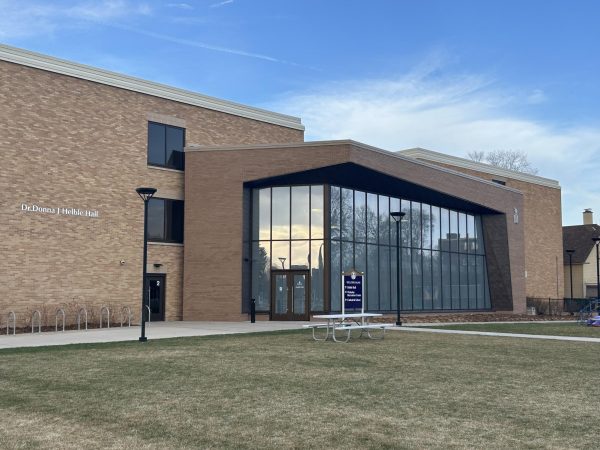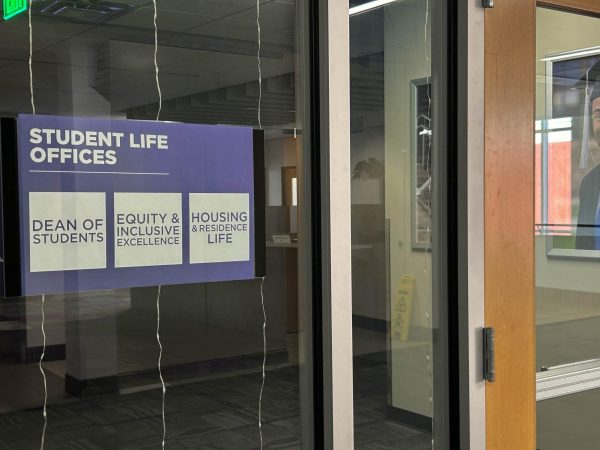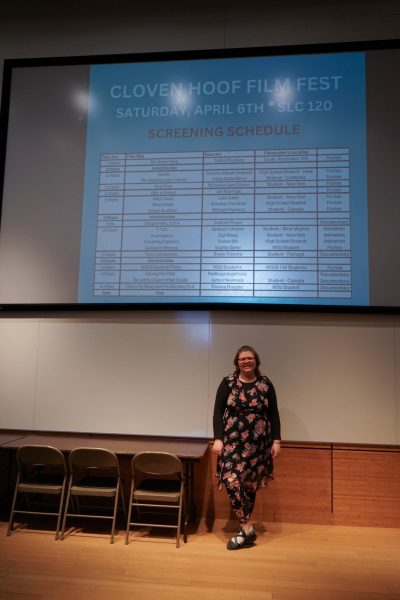Winona State hosts prominent Black feminist activist Loretta Ross for Women’s History Month
April 7, 2021
Winona State University hosted renowned Black feminist activist and scholar Loretta Ross via Zoom on Tuesday, March 30 as the keynote speaker of its lineup of speakers and events for Women’s History Month.
Ross has been described as “the leading scholar of reproductive justice” by Winona State Associate Professor of Women’s, Gender and Sexuality Studies Mary Jo Klinker and is credited for coining the phrase “reproductive justice”.
Tamara Berg, director of Winona State’s women’s, gender and sexuality studies program, has hosted the university’s Women’s History Month events for more than 20 years and said she was thrilled to welcome and introduce Ross.
“She [Ross] embodies the feminist notion that the personal is political and brings her life experiences to her work,” Berg said.
Ross began her lecture, accompanied by PowerPoint slides and video clips, by describing her history of involvement in various women’s rights and social justice movements, including in the Anti-Rape Movement, the Black Women’s Health Movement, the Anti-Ku Klux Klan Movement and more.
She also said while she has worked in various small collectives as well, she also started the National Organization for Women’s program for women of color, is co-creator of the reproductive justice theory and practice, is co-founder of SisterSong Reproductive Justice Collective and is currently a professor at Smith College in Massachusetts teaching about sexuality studies, culture and white supremacy.
She then dove into the creation of the reproductive justice theory and framework, beginning with how she and 12 other women conceptualized it in the summer of 1990, “splicing together the concepts of reproductive rights and social justice.”
However, Ross made sure to point out how reproductive justice was not a new movement or idea but had just not received that specific terminology until the ‘90s. She showed images of Black women from the 1970s protesting sterilization abuse, which is a reproductive justice topic.
Ross explained the three core principles of the reproductive justice theory and framework: every woman has the human right to have a child; every woman has the human right to not have a child; every woman has the human right to parent her children in a safe and healthy environment.
“This [the three core principles] brings us in a conversation with all those non-biological things,” Ross said. “Tax policies and how school funding works, whether or not environmental toxins are in people’s drinking water, in their food or the landfills that are adjacent to their
houses, whether people suffered from prejudice or discrimination and can’t afford car, those kinds of things.”
Ross explained there was pushback from “a lot of different places” against the reproductive justice conception in 1990, including from queer people of color. This pushback birthed a fourth reproductive justice principle 10 years later, according to Ross, the fourth principle being: individuals have the human right to disassociate sex from reproduction and that healthy sexuality and pleasure are essential components to whole and full human life.
Ross also spoke on events and topics connected to reproductive justice–and the lack thereof–spanning back centuries in history, including prior to and during the Civil War.
“Before the Civil War, our [Black women’s] fertility was profitable because plantation owners wanted us to have as many babies as possible and they achieved this through forced pregnancy, rape and all kinds of other issues,” Ross said. “But then as soon as our fertility became less profitable because slavery was over, it became criticized.”
Ross continued, tying those statements into modern topics and social issues, including current child welfare policies and the foster care system.
She then spoke about the U.S. legal system, saying it is “apparently race-neutral, but is implemented in a very racist way.”
Sterilization and contraception were then discussed, Ross saying, “No contraceptive is perfectly safe, although people should be able to make informed choices about which contraceptive that they choose to use.”
During a Q&A segment following Ross’s lecture, people were free to ask questions or send in questions to the Zoom chat, which Berg read out loud for Ross to answer.
Many Winona State faculty members were present throughout the event and during the Q&A, including Communication Studies Chairperson Emilie Falc, engineer professor Beckry Abdel-Magid, intercultural coordinator for Winona State’s Office of Equity and Inclusive Excellence, Tyler Treptow-Bowman and more. Students, alumni and the Warrriors for Life club were also in attendance.
One question addressed the Pro-Life Movement, to which Ross pointed out the various interpretations of.
“First of all, everyone using the moniker ‘pro-life’ doesn’t mean the same thing by it. I mean, the SisterSong–my organization–was founded by people who define themselves as pro-life and pro-choice. The way that they [pro-life people in the organization] defined pro-life is that, ‘I wouldn’t have an abortion myself, but I wouldn’t stop you from doing so.’”
Ross said that was a definition of pro-life that she “could get with” because it is based on “self-determination” and those with that understanding were willing to “stop their beliefs at my body”.
Ross said the Anti-Abortion Movement is about not wanting anyone to “have a voice” on whether they get pregnant or not or whether they carry out their pregnancy full term or not.
“You can’t just paint people who use the word ‘pro-life’ with a broad brush and assume they all mean the same thing,” Ross said.
Jamie Scherdin, student and president of the Warriors for Life club, attended the Zoom under the Warriors for Life Zoom account name along with about five other members of the club in a room with her. Scherdin also asked a question during the Q&A.
Scherdin thanked Ross for speaking at Winona State and said she agreed with many of her lecture points, including people needing accurate information about contraception.
Scherdin asked, “Do you think people should also be aware of the fact that the International Agency for Research on Cancer and Mayo Clinic of Rochester classifies hormonal contraception as a carcinogen? Human group one [referring to known human carcinogen groups], as well as oral contraceptives, are associated with an increased risk of breast cancer, particularly among current and recent users. Do you think people should be aware of that?”
Ross replied by saying she believed Scherdin was “onto something” with her question, but that it [contraceptives] is “more complicated than what you’re [Scherdin] saying.”
Ross said there is no such thing as a “totally safe” contraception besides abstinence and said some of the data Scherdin mentioned seemed “suspicious”, particularly in regard to hormonal contraception.
“Don’t ever think that we’re ever going to create contraceptives that [are] 100% safe. It’s about people’s right to determine those risks for themselves. Just like you can’t create a totally safe car, you just decide which one you’re gonna buy and gonna be safe in. You get to do your own risk assessment,” Ross said. “But each human gets to decide their risk for themselves, not have somebody else mislead them with bad data.”
A person under the Zoom screen name Grant Montgomery sent a question via Zoom chat to Ross, saying “I’ve heard you say before that repro oppression allows those with agendas to control communities. If you control who has kids, you control their community’s destiny. I agree. To build on the pro-life question, do you think that the repro justice mvmnt can find common ground with the pro-life mvmnt on encouraging women, (esp. black women) to choose life-affirming options outside of abortion? Otherwise, don’t those who seek to profit from abortion succeed in profiting off of coercing POCs to exterminate themselves?”
Anna Wilwerding, a student at Winona State and member of Warriors for Life, sent a “^” symbol seemingly in agreement with Montgomery’s statements and question.
Ross told Montgomery she was offended by the question and did not like its “racist analysis”.
“I don’t like racist analysis that assumes Black people can’t think for our fucking selves. When you start off with that premise, you’ve already offended me,” Ross said. “So, don’t come at me with racist analysis and ask me to agree with it. We ain’t ever been confused. It’s white people who get confused, thinking they can be more racially conscious than Black folk. I’m sorry, I have to just state: don’t come at me with a racist analysis.”
The Zoom event began at 7 p.m., at which time 64 people were in the Zoom room. By 7:04 p.m., 70 people had entered the Zoom room.
At the event’s peak, 76 individual Zoom accounts were logged into the event, Ross’s lecture and following Q&A session lasting roughly two-and-a-half hours.
Several other faculty members and students also asked Ross questions and stayed afterwards as well for an informal hangout and discussion, which included Ross, alumni, students, Berg and Klinker.






























































